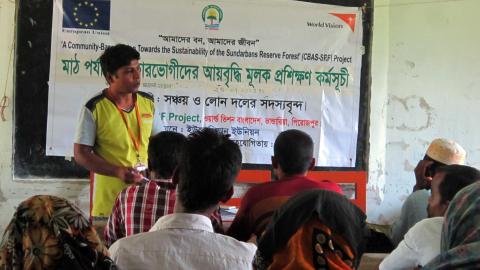
CBAS Project
World Vision Bangladesh is implementing ‘Our Forest, Our Life : A Community-based Action Towards the Sustainability of the Sundarbans Reserve Forest (CBAS-SRF)’funded by the European Union. This project is working in the southwest coastal region of the country to improve the biodiversity of the forest, reduce the risk of disaster in Sundarban dependent communities and develop alternative livelihoods for the targeted communities.
Photo: A women is providing poultry feed as a part of alternative livelihood by rearing chickenFocusing on environmental conservation and using climate change adaptation methodologies the CBAS-SRF project is addressing the poverty and food insecurity of 6 lakhs (60,000) people who are partially or fully dependent on the Sunderbans for their livelihoods.
Duration: February 2012-September 2015
Geographical Location
The CBAS-SRF Project is implemented in two districts of Khulna and Barisal divisions, covering 15 unions and one municipality under four upazilas.
Project locations
District : BagerhatUpazila :Mongla
Union :Chilla, Chadpai and Sundarban unions and Mongla municipality
Upazila :Morelganj
Union :Jewdhara, Khawlia, Baroikhali, Nishanbaria, Hoglabonia and Baharbunia
Upazila : Sarankhola
Union : Rayenda, DhansagarDistrict : Pirojpur
Upazila Bhandaria
Union : Ikri, Nudmulla, Telikhali and Bhitabaria
As a major partner of the Forest Department under the Ministry of Forest and Environment and Co-Management Committee of the Sundarbans Reserve Fund, WVB provided active support in implementing the project activities in FY 2013. Around 2,215 people consisting of community leaders and resource collectors participated in various workshops with the objective of linking them up with Co-Management Committee and learn resource management. Village People’s Forums were also developed, with 1,042 men and 115 women, following the Co-Management Committee structure.
During the FY-2013, the CBAS project transferred knowledge on disaster management to 565 men and 203 women. The project distributed 333 energy efficient stoves aiming to contribute in reducing the over exploitation of biomass energy sources and to allow bio-fuel savings. A total of 189 savings and loan groups were formed, covering 2,924 men and 1,576 women. Through the Cash for Work program, 823 men and 227 women were covered with short term employment. In addition, the project provided non-formal education to 1,000 children and vocational training to 496 children aged 16-17 years.